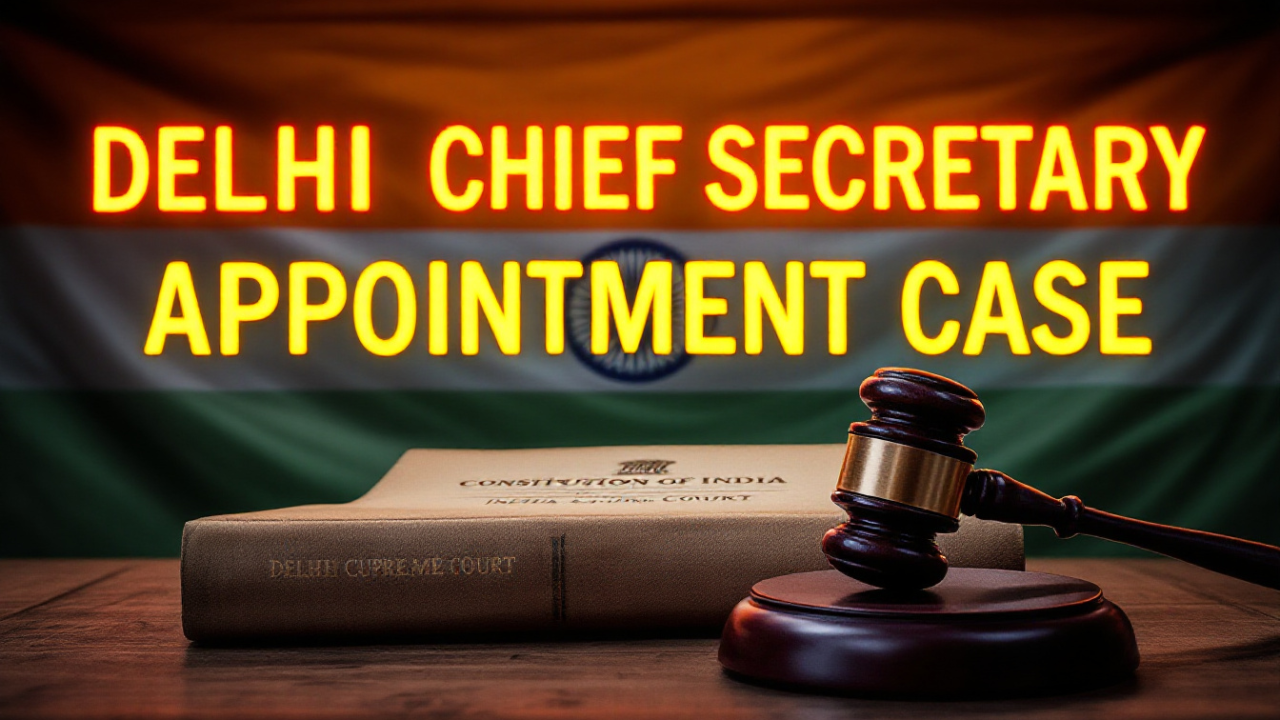Judgment Title: In re: Appointment & Extension of Chief Secretary (GNCTD)
Date: November 2023
Context: Delhi's Unique Constitutional Status
Delhi is not like other Indian states. Governed under Article 239AA of the Constitution, the Government of National Capital Territory of Delhi (GNCTD) has an elected legislature with limited legislative and executive powers. Yet, "Public Order," "Police," and "Land" remain with the Union Government.
This case arose when the Chief Secretary of Delhi was due to retire in November 2023. Fearing a unilateral extension or appointment by the Centre, the Petitioner (a political party in power in Delhi) approached the Supreme Court under Article 32, seeking judicial restraint on the Centre's move.
Core Legal Questions
- Does the Union Government have unilateral power to appoint or extend the tenure of Delhi's Chief Secretary?
- Could you make such an appointment without the aid and advice of the Delhi Council of Ministers?
- Do the Transaction of Business Rules, 1993 or the GNCTD (Amendment) Act, 2023, override previous constitutional interpretations?
Key Supreme Court Findings
1. Union Can Appoint and Extend the Chief Secretary's Term
- The Chief Secretary's role spans Delhi Government matters and Union-controlled subjects like land, police, and public order.
- Since the post cannot be practically divided, appointment powers must rest with the Centre.
- Even service extension, typically requiring State Government recommendation under Rule 16 of AIS (DCRB) Rules, is permitted for Delhi's Chief Secretary without such recommendation.
2. GNCTD's Role Limited to Proposing, Not Deciding
- Under Rule 55 (2) (b), the Lieutenant Governor (LG) must refer proposals to the Union Home Ministry.
- Under Rule 56, the Centre's decision is binding.
- Hence, Delhi's elected government has no final say in the appointment or extension.
3. GNCTD v. Union of India (2023 Constitution Bench Judgment) Interpreted
- While the 2023 Constitution Bench held Delhi has executive control over 'services' under Entry 41 (except for land, police, and public order), this new judgment clarifies:
"The Chief Secretary also supervises the three excluded subjects. Hence, the Centre cannot be divested of authority over this post."
4. Definition Clause Can Have Substantive Impact
- Section 45A(d) of the amended GNCTD Act defines the Chief Secretary as one appointed by the Central Government. Though argued as a mere definition, the Court accepted its substantive implications, considering legislative intent.
Noteworthy Observations by the Court
- The Chief Secretary is the "lynchpin of the administration", a post requiring confidence and neutrality.
- Despite being appointed by the Centre, the Chief Secretary is bound to follow the directions of the Delhi Government on matters within its legislative competence.
- Administrative neutrality must be upheld to avoid a constitutional logjam.
Implications of the Judgment
- Clear demarcation of powers between GNCTD and the Union is crucial in managing future federal disputes.
- Establishes precedent that "definitions" in law can carry substantive legal weight when linked with institutional power.
- Indicates the rising complexity of cooperative federalism in India, especially in hybrid governance models like Delhi.
Why This Verdict Matters
- Bureaucrats: Clarifies reporting lines and role expectations.
- Policy Thinkers: A case study in executive power-sharing.
- Constitutional Scholars: Reinforces evolving interpretations of Article 239AA.
- Political Analysts: Highlights institutional friction in Centre-State relations.
Closing Note
The Supreme Court has once again balanced the scales of constitutional federalism, governance efficiency, and democratic accountability. As India's governance model evolves, such verdicts shape the principles that sustain our institutions.
Let's remember: In a democracy, power is best exercised with clarity, not with control.
#SupremeCourtOfIndia #DYChandrachud #IAS #DelhiGovernment #Federalism #ConstitutionalLaw #Governance #LegalUpdates #IndianPolitics #CivilServices #PublicAdministration #LinkedInLaw
Dr. Payal Arya Sah

